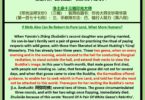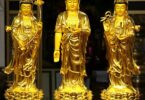Teacher Shi’an, we texted a couple of weeks ago, and you had encouraged me to write about my experiences on managing my Mom’s passing (on the early morning of 4 October 2020). Hopefully, there are some parts relevant for sharing with fellow Purelanders below.
My Mom was hospitalised thrice for about a month within September and October. The first two admissions were for lung infections. Before her first admission, she was sleeping about 90% of the time and ate very little. Although she appeared better after discharge, it was only for a short while. She was so weak that she was unable to walk and even talk. She was soon admitted again after two weeks for the same problem.
After her second discharge, she continued to sleep most of the time, neither eating nor drinking. We were initially hesitant to send her to hospital the third time as we noticed that whenever she discharged, she seemed overall weaker, though her lung infection was resolved. That was when I messaged you for guidance, and you reminded me that if we do not do anything, she might starve to death. Our concern was that as she might not have much time left, we do not wish to have excessive and intrusive medical treatments administered on her. (Although hard to define at times, what needed is reasonable care, while excess ‘care’ can become unreasonable.) I had agreed with my siblings that we will Niànfó (念佛) to help her reach Pure Land when the time comes, but the problem was that we did not know when it will be. It was a difficult decision but we felt that we should not deprive her of medical care and food.
Two days before her third admission, she was extremely restless with many hand movements. I could see that she was uncomfortable. I stayed by her side that night to Niànfó for her, also talking to her, telling her that as her children and grandchildren are all grown up and doing fine, she can let go and not worry about us. I had always wondered how anyone can Niànfó for hours with determination and not feel tired. This is the first time I experienced that.
I did Niànfó from 2am to almost 7am that night. I didn’t really feel tired; just thirsty. She appeared better that morning, although she wasn’t very responsive. It was a good experience, doing Niànfó for almost 5 hours alone and for her, realising that it is possible to do so for extended time. (Āmítuófó’s [阿弥陀佛] light contains the blessing of uninterruptedness [不断], that enables diligent practice. The more sincere Niànfó is, the more connected one will be to his blessings, and the more easily can it go on.)
When my Mom was admitted the third time, her condition deteriorated quickly. She was put on drips and feeding was done with a tube through her nose. She was unconscious and had an oxygen mask on. On the second day, she was breathing heavily, as if gasping for air – taking a deep breath and exhaling heavily every two to three seconds. Seeing her in that condition was a painful sight.
On the second night, I took over the night shift at around 10pm. I was alone with her as the rest of the family had gone home to rest. Sitting next to her, I spoke to her again on letting go, also doing Niànfó. The nurses came in occasionally to examine her, and to replenish the drips and feed. I cherished the time I had with her. Although she seemed unconscious, I felt that she was listening to what I was saying, as I encouraged her to Niànfó with me. At 1.20am, I saw her take a deep breath, and there appeared to be a smile, (though it could be my imagination), as she closed her lips and exhaled. She did not breathe again.
I was prepared for this moment, as I went out to call for the nurses. They said she might have departed but needed a doctor’s certification. I stopped them from removing anything on her and from touching her. I took out the Rebirth Blanket (往生被) to cover to her chin. (The Rebirth Blanket is ideally put on once in the dying phase, not just after passing, for extra blessings and protection.) I then told her she has passed away, that she need not be fearful, and should follow me to Niànfó, and follow Āmítuófó to his Pure Land, where there is no suffering, only having bliss. (When one with dementia passes away physically, as the consciousness will be disconnected from the diseased brain, the mind will function without dementia, and be able to understand guidance offered clearly.) When the doctor arrived to certify her death, I also prevented him from touching her body, except when he had to open an eye, to shine light to check for dilation.
I called my family members to inform of her passing and continued to Niànfó until they arrived. My brothers, sister, sister-in-laws, nephews and nieces joined in to Niànfó. My second brother and I took turns to talk to my Mom periodically, telling her that she has passed on and should wholeheartedly Niànfó with us. I had requested the nurses to allow us to have eight hours of Niànfó, but they said that only an hour or so is permitted. I spoke to the staff nurse and she eventually allowed us to Niànfó until about 5.30am. Fortunately, it was early morning, with no new patients and visitors. If it is busy in the day, I don’t think we would be accommodated.
The amazing thing is that all family members present followed the instruction to Niànfó with no questions asked. Thinking back now, I wonder how we managed to Niànfó for close to four hours without feeling tired. (Again, this is with the blessings of Āmítuófó’s light, even if not seen.) Also, most did not cry as I told them not to do so if they wanted to help my Mom. (Crying can create attachment for the dying and deceased.) Those who couldn’t hold back their tears left the room and came back to Niànfó after they got a hold of themselves. Although I was distracted during Niànfó as I had to arrange for the undertaker, it was a blessing that the other family members present continued with uninterrupted Niànfó. Before we ended at about 5.15am, I gently tugged at a few strands of hair on top of her head. (This is to urge the consciousness to depart from the crown to reach Pure Land, if not yet departed, before the body is further handled, which will be extra painful after death, if the consciousness is still within.)
Before having dementia, my Mom was a Taoist. After Teacher Shi’an gifted me with an Āmítuófó picture scroll about two years ago (through the kind sponsorship of another Pureland Practice Fellowship Purelander), I put it up in her room and encouraged her to Niànfó every day. She followed what I said, and I did see her put her hands together to Niànfó in the morning and night daily, but with each time lasting not more than 10 chants. It helped that my maid is a Buddhist, who also encouraged her to Niànfó daily.
One day, in hospital, during the first or second hospitalisation, she held up a pendant with Āmítuófó’s image, which I gave her to wear, and told me that she needed to chant 100 times. Holding it up, she appeared to do silent Niànfó. I wasn’t sure if she could still count but it was one of the longest chanting sessions I had seen her do, lasting about 10 minutes. Subsequently, I saw her do that on a few occasions, in hospital and at home.
We engaged Vimalakirti Buddhist Centre as the undertaker for a pure Buddhist funeral (e.g. without burning of paper money, houses and cars). Fortunately, there were no objections from any family members, though some are Taoists. They left the funeral arrangements to me. I’m grateful to have attended the ‘Destination Pureland: How To Have The Best Rebirth’ course (that was taught according to purelanders.com/now) twice. With what learnt, I did what I could, though I might not have done all that should be done.
I’m her youngest son, and my Mom stayed with me during her last 12 years. Thus, I was surprised that I did not cry when she departed. I suppose I was focused on helping her to reach Pure Land. Fortunately, my second brother and his wife were also determined. The other family members just followed us. I realised after the funeral that when I was ‘counselling’ my Mom to let go and move on, I was counselling myself as well. This could be why I did not cry. I was already mentally prepared, and fully accepted that she will leave us when her time is up.
I’m not sure if my Mom was able to reach Pure Land, but I’m hopeful that she will. (Even if she does not reach Pure Land immediately, with the pure seed of affinity with Āmítuófó already planted, she will do so eventually.) I still Niànfó daily and dedicate it to all sentient beings and my Mom, for them to reach Pure Land, also asking her, if still present, to also Niànfó. (Am not sure if there is any auspicious significance, but her bone remains after cremation have shades of lime green and red.)
My Mom’s departure is an experience that I will remember forever, as I was the only one to witness her last breath. Her last deep breath followed by her exhalation seemed like the following parting words to me – ‘I’ve heard you, and it’s time for me to go.’ Teacher, thank you once again, for the teachings all this while.
Note On Dementia: A little more about my Mom’s dementia, and some challenges overcome… She could not really remember things. Even for meals, she got confused. Initially, it was quite frustrating, but we learnt to accept her condition as it is. It was painful to picture how she was like when she was healthy, versus after having dementia. It did help that we are able to watch on TV and read in the news that this is a common issue for many of the elderly, with more awareness created among family members. Once we accepted it, things became easier for us, at least psychologically.
We then looked at how to make her more comfortable. There were definitely inconveniences but fortunately we have a reliable maid, who is also her caregiver. We reduced her domestic work to let her focus more on my Mom. The other family members rolled up their sleeves to take care of some domestic chores too. As the caregiver, she needed understanding and support too. When she felt discouraged at times, my wife would talk to her, to make her feel better. Being Buddhist too, the caregiver was able to apply loving-kindness and compassion when looking after my Mom. We are all very thankful towards her.
Note On Encouraging Niànfó: One of the key challenges was my Mom’s short attention span. I was unsure if I would be able to get her to Niànfó at first, but wanted to do my best. The Āmítuófó scroll was most helpful. I put it up in her room and I told her that it is Āmítuófó, asking her to put her palms together, to Niànfó before it. Fortunately, she was able to acknowledge Āmítuófó and do so.
Whenever I went to her room, the first thing I did was put my palms together, face Āmítuófó’s image and Niànfó, asking her to do the same. She would follow. In most instances, she would only do five to six chants. Especially during weekends, I would go to her a few times a day to remind her to Niànfó. I asked the caregiver to encourage her to do so during weekdays as well. She told me that she would do so three to four times a day, with just a few chants each time.
I was nevertheless very encouraged, as with her condition, having less ability to comprehend, I could not tell her much about the Pure Land teachings. Towards the last two months before her passing, my brother and I started to tell her that she should Niànfó, and when Āmítuófó appears, she should follow him. We felt then, that she might not have much time left with her worsening condition. We could see that she understood what we were saying, which was extremely comforting.
To put it briefly, I greeted her every time I saw her, even though we are staying together, with my palms together and with Niànfó, also urging her to do the same. She never failed to follow. This is an instruction that she was able to follow without much difficulties. In fact, it came to the stage when I did not have to say anything, but just put my palms together towards Āmítuófó’s image, and she would do the same and start to Niànfó.
Námó Āmítuófó: THB (with additional notes by Shen Shi’an)
26 Oct 2020
(Name abbreviated for privacy)





